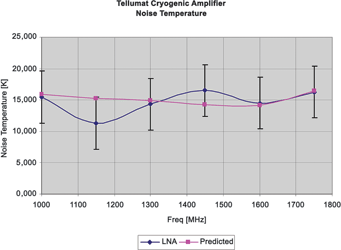
Tellumat has invested in innovative, locally developed solutions that will form key elements of the current MeerKAT and hopefully the future Square Kilometre Array (SKA) project.
The MeerKAT array, currently taking shape in South Africa’s Karoo region, is a world-class radio telescope designed to do ground-breaking science. It will be the largest and most sensitive radio telescope in the southern hemisphere until the SKA is completed around 2024. Via MeerKAT, South Africa is playing a key role in design and technology developments for the SKA.
Tellumat has been responsible for the electronic receiver design for the KAT-7 project which was the precursor to the current MeerKAT project. The one element of the full electronic receiver chain that was imported from an international supplier, was the cryogenic low noise amplifier. Tellumat’s investment will now allow for this solution to be sourced locally while also creating jobs as part of the supply value chain.
How does it work?
An ultra-low noise amplifier for the reception of weak signals from space has been designed and developed at Tellumat. To achieve the requisite low noise performance, the amplifier was designed to be cooled, and operate, at liquid nitrogen temperature which is 77 Kelvin or -196°C.
All amplifiers make received signals stronger, but they also add unwanted noise to the signal. In everyday life, this is the same as the hiss one hears when a HiFi’s volume is turned up while no music is being played. Amplifier noise degrades the signal and it is desirable to minimise it. The advantage of cooling the amplifier is that the random thermal noise which is caused by the motion of the electrons in the amplifier’s internal components (transistors, resistors etc), reduces as the amplifier is cooled down to very low (cryogenic) temperatures.
To illustrate the performance obtained, it is useful to compare two cases: the best performance achieved without cryogenic cooling (ie, the best off-the-shelf amplifier operating at normal room temperature) will add noise equivalent to a physical temperature of 28 Kelvin. The performance obtained by the Tellumat amplifier will add noise equivalent to 15 Kelvin ie, it offers almost twice the sensitivity of the best commercially available room-temperature amplifiers.
This almost halves the number of receiving dishes required for a given radio telescope sensitivity or allows almost twice the sensitivity with the same number of dishes. The Tellumat amplifier provides for amplification of 1000-fold (30 dB), and amplifies signals in the 1000 MHz to 1800 MHz frequency range, as required by the MeerKAT radio telescope.
The LNA curve in Figure 1 is the measured performance of the prototype (noise temperature vs. operating frequency) and the vertical bars indicate the expected measurement uncertainty. The predicted performance curve originates from the computer aided engineering (CAE) design, and it lies neatly within the measured values and associated measurement uncertainty.

For more information contact Shaun Hendricks, Tellumat, +27 (0)21 710 2442, [email protected], www.tellumat.com

© Technews Publishing (Pty) Ltd | All Rights Reserved